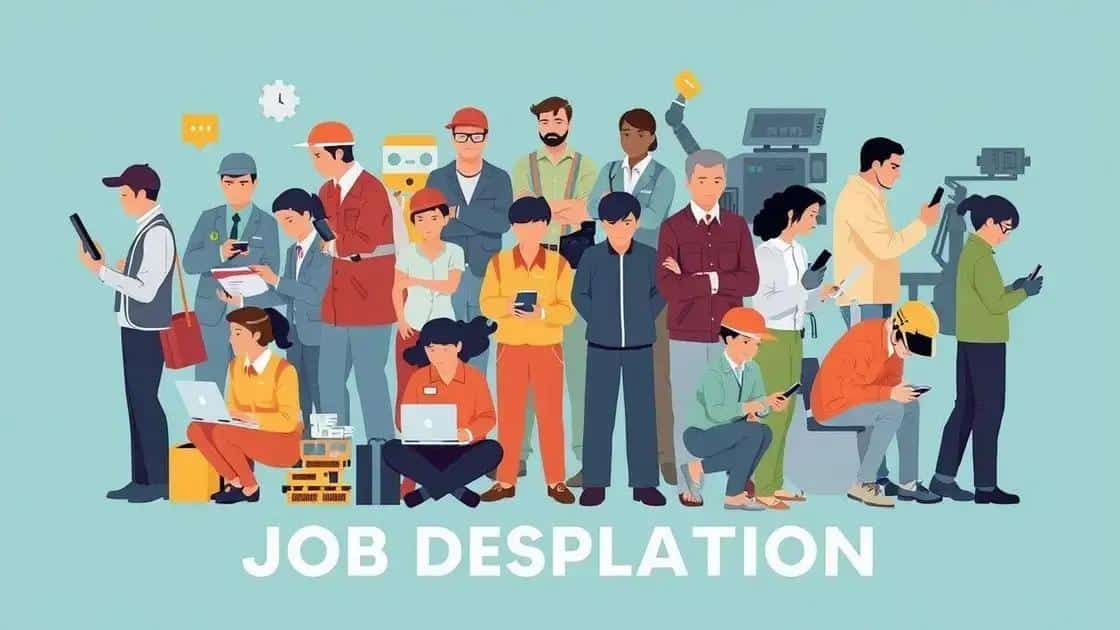Impact of automation on jobs: what you need to know

Anúncios
The impact of automation on jobs involves job displacement in some sectors while creating new opportunities, requiring workers to adapt their skills and policymakers to implement supportive strategies for transitions.
The impact of automation on jobs is a hot topic as technology evolves. You might wonder, how will your career be affected? Let’s delve into the nuances of these changes.
Anúncios
Understanding automation and its technology
Understanding automation is crucial to navigating the future job market. It’s not just about robots taking over tasks; it encompasses various technologies that enhance productivity. The automation industry is growing rapidly.
What is automation? It refers to using technology to perform tasks that would otherwise require human effort. This can range from simple processes like email responses to advanced robotics in manufacturing.
Anúncios
The types of automation technologies
There are several prominent types of automation technologies shaping industries today:
- Robotic Process Automation (RPA) – Focuses on automating repetitive tasks easily.
- Artificial Intelligence – Enables machines to learn and make decisions.
- Machine Learning – A subset of AI that improves through experience.
- Industrial Automation – Involves robots and machinery in production lines.
Each of these technologies plays a unique role in how businesses operate. For instance, RPA simplifies administrative duties, allowing employees to focus on more strategic tasks. The introduction of AI transforms how decisions are made, providing insights based on data analysis.
Real-world applications
Industries utilizing automation experience significant benefits. In healthcare, automated systems help manage patient records efficiently. In finance, algorithms streamline trading processes. Automation leads to higher efficiency and lower costs.
It’s important to remember that while automation can displace certain jobs, it also creates new opportunities. Skills that are in demand evolve alongside technological advancements. Workers will need to adapt and learn new skills to thrive in this changing landscape.
Understanding automation encourages us to embrace change rather than fear it. By staying informed and acquiring relevant skills, anyone can prepare for a future shaped by technology.
Job displacement and creation

Job displacement and creation are significant outcomes of the growing impact of automation. As technology advances, certain jobs may decline, while new opportunities arise in other areas. Understanding this dynamic is essential for workers today.
Job displacement occurs when machines or software perform tasks previously done by humans. For instance, roles in manufacturing are changing as robots take over repetitive tasks. This shift can lead to workforce reductions in sectors depending on manual labor.
Examples of job displacement
Industries are adapting to automation in various ways. Here are some examples of roles affected:
- Cashiers – Many stores now use self-checkout systems.
- Manufacturing workers – Robots are used for assembly lines.
- Data entry clerks – Automated systems can manage records efficiently.
- Telemarketers – AI systems handle customer calls and inquiries.
While these shifts can cause concern for workers in these roles, it is crucial to recognize the creation of new jobs in response to automation. As old positions fade, new opportunities emerge that require different skill sets.
Opportunities in the new job landscape
Many sectors will expand due to the demand for new technology. This includes jobs in maintenance, programming, and system management. The workforce will need to adapt, developing relevant skills for these evolving roles. Growth areas include:
- Data analysts – Interpreting information generated by automated systems.
- AI specialists – Designing and refining AI technologies.
- Cybersecurity experts – Protecting automated systems from threats.
- Robotics engineers – Developing new robotic technologies.
Workers can prepare for these changes through education and training. Lifelong learning is vital in this rapidly changing job market. By acquiring new skills, individuals can remain competitive and find fulfilling careers in the age of automation.
Adapting skills for an automated future
Adapting skills for an automated future is crucial for anyone looking to thrive in today’s job market. As automation technologies advance, workers must evolve their skill sets to meet new demands. Embracing change will enable individuals to secure their place in an ever-evolving workforce.
One key area is technical skills. Understanding and managing new technologies are invaluable in a world where automation is becoming commonplace. Familiarity with programming languages and data analysis can significantly enhance job opportunities.
Essential skills for the future
Here are some essential skills to consider for adapting to an automated future:
- Critical thinking – Solely relying on machines isn’t enough; analyzing and interpreting results is key.
- Creative problem-solving – Automation brings challenges that require innovative solutions.
- Digital literacy – Comfort with various software applications is necessary across many jobs.
- Collaboration – Working alongside automated systems requires strong teamwork and communication skills.
In addition to technical skills, soft skills play an essential role in this transformation. Skills such as adaptability, emotional intelligence, and resilience will help workers navigate changes in their fields.
Training and education will also play a vital role in this adaptation process. Continuous learning is becoming a norm, with many professionals seeking online courses, workshops, and training seminars. These pathways equip individuals with relevant knowledge and keep them updated on trends in their industries.
The workforce of the future will be a blend of humans and machines, working together to achieve greater efficiency. By focusing on building a diverse skill set, individuals can take advantage of opportunities created by automation rather than being left behind.
The role of policy in job transition

The role of policy in job transition is essential for managing the effects of automation on the workforce. As industries evolve, governments and organizations must create strategies to support workers through these changes. Effective policies can help mitigate the negative impacts of job displacement.
Policies can include various forms of support such as retraining programs, unemployment benefits, and incentives for companies that create new jobs. These measures ensure that workers have the resources they need during transitions.
Key components of effective job transition policies
To facilitate successful job transitions, policymakers focus on several critical areas:
- Education and training: Investing in skills development ensures workers can learn new technologies and adapt to changes.
- Job placement services: Helping displaced workers find new employment quickly reduces the duration of unemployment.
- Incentives for businesses: Providing tax breaks or grants to companies that hire and train displaced workers encourages job creation.
- Collaboration with industries: Engaging with industry leaders ensures that policies reflect current workforce needs and technological trends.
Moreover, it is essential to create policies that promote inclusive growth. This means ensuring that all workers, regardless of their background or skills, have access to support and opportunities in the changing job landscape.
As automation continues to reshape industries, the importance of proactive policies becomes evident. Addressing the challenges faced by workers will not only benefit individuals but also contribute to overall economic stability. Engaging stakeholders at all levels—from government to private sector—will help create a more resilient workforce.
FAQ – Frequently Asked Questions about the Impact of Automation on Jobs
How does automation affect job availability?
Automation can lead to job displacement in some sectors but creates new opportunities in others, requiring a shift in skills.
What skills are important for adapting to automated jobs?
Key skills include technical abilities like programming, critical thinking, and soft skills such as adaptability and communication.
What role do policies play in job transitions due to automation?
Policies can provide support through retraining programs, unemployment benefits, and incentives for businesses to hire displaced workers.
Why is continuous learning important in the context of automation?
Continuous learning helps workers stay relevant and competitive in a rapidly changing job market shaped by automation.






